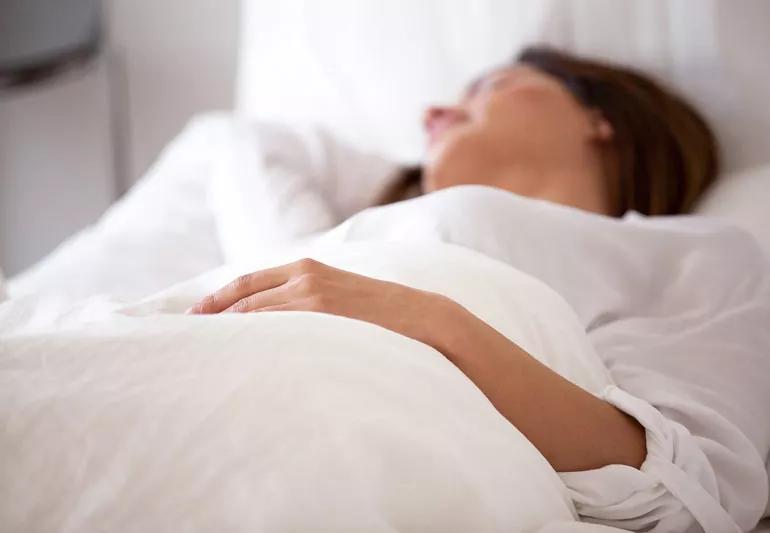There could be a simple fix

Ahhhh, sleep. It’s the best — unless you know you’re going to wake up in pain. Then sleep becomes something you dread. The more pain you have, the harder it is to sleep. And wouldn’t you know it: Low-quality sleep leads to greater pain.
Advertisement
Cleveland Clinic is a non-profit academic medical center. Advertising on our site helps support our mission. We do not endorse non-Cleveland Clinic products or services. Policy
Could the cause of your back, neck or all-over morning pain have a simple explanation?
“When you move, the tissue surrounding your joints secretes a fluid that lubricates your joints, allowing bones to move past one another easily,” says pain medicine specialist George Girgis, DO.
“During the day, you’re moving around, which keeps the fluid flowing. But the lack of movement at night can lead to inflammation, stiffness and pain come morning.”
If you see a doctor for your pain, they will likely want to do some simple screening tests to determine if immobility-induced inflammation is what’s causing it. Your doctor will want to rule out other conditions that cause inflammation of joints and tissues, such as:
If there isn’t an underlying condition causing your pain, it’s time to take action.
Update your sleep software. Sometimes you can achieve a great night’s sleep with a simple pillow adjustment. The right pillow correctly aligns the part of your spine that’s in your neck so that muscle tightness doesn’t occur when you sleep. Or you may need a new mattress. Consider a mattress an investment in your health. “We recommend a firm (but not TOO firm) mattress for the best-quality sleep,” Dr. Girgis says.
Switch up your diet. Avoid foods that promote inflammation. The Mediterranean diet, which features a lot of veggies, fruits, whole grains and seafood, may increase the antioxidants that help reduce inflammation.
Advertisement
Exercise (but don’t overdo it). Movement lubricates joints, which keeps pain and stiffness at bay. Be careful though: Exercising near bedtime or overtraining can lead to insomnia. “Shoot for 30 minutes a day, five days a week,” Dr. Girgis says.
Take a vitamin D supplement. Your bones and muscles need vitamin D for optimal health. Most people don’t get enough vitamin D through their diet, so talk to your doctor about choosing a supplement or foods with added vitamin D.
Try a new sleeping position. Sleeping on your stomach could be contributing to your morning pain. Instead, sleep on your back with a pillow under your knees to keep your spine in a neutral position. Alternatively, you can sleep on your side with a pillow between your knees.
Keep your muscles supple. Inflammation can occur when muscle mass breaks down. Find ways to maintain your muscles — gym membership not required.
“Yoga is a great way to maintain muscle mass because you’re using your body weight to keep muscles healthy,” says Dr. Girgis. “Other options may include lifting a heavy cookbook as a weight or performing squats at your desk.”
Relieve stress. Exercise, yoga and massage relieve inflammation by increasing blood flow to your muscles. You can also incorporate mindfulness meditation, which has been clinically shown to change the way your brain processes pain. Over time, pain intensity decreases with meditation. To meditate, concentrate just on breathing. If your attention wanders, return your focus to your breathing or the sounds around you. Start with a minute and build up to more time.
Stub out cigarettes for good. There are so many reasons to quit smoking, but you can add pain relief to the list. “Smoking prevents oxygenated blood from reaching bones and tissues,” says Dr. Girgis. “It also limits the exchange of oxygen and carbon dioxide in your blood, making the blood quality lower. The result is weakened muscles.”
Advertisement

Sign up for our Health Essentials emails for expert guidance on nutrition, fitness, sleep, skin care and more.
Learn more about our editorial process.
Advertisement

To avoid sleep deprivation and shift work sleep disorder, try adopting habits that minimize light exposure and prioritize daytime sleep

Sleep disorders, mental health conditions and other health concerns can all affect the quality of your sleep

Most people fall asleep within 10 to 20 minutes, but if your experience is different, adjusting your sleep schedule may help

Stick to a consistent schedule, be mindful of screen time and work on reducing your stress levels before bed

Napping can boost focus, memory and mood — if you time it right
These devices can help shed light on what’s happening with your body during rest

Keep a dream journal, set your intentions before bed and make sure you’re getting a full night of high-quality sleep

Controlling your dreams may help you tap into your creativity and even reduce anxiety

Even small moments of time outdoors can help reduce stress, boost mood and restore a sense of calm

A correct prescription helps your eyes see clearly — but as natural changes occur, you may need stronger or different eyeglasses

Both are medical emergencies, but they are very distinct events with different causes